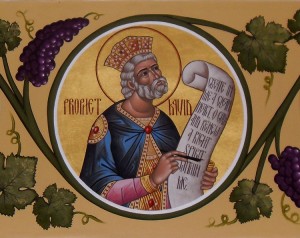 The Psalter – the song book of our Hebrew ancestors and the first hymnal of the Church – is a constant in the life of the Orthodox Church. Not only do we sing the Psalms at Matins and Vespers as often as they are celebrated, but Psalm texts are scattered throughout all the other services, especially in the Western Rite services. In the conservative Roman Patriarchate during the formative years of the Rite, the Psalms were preferred (for antiphons and introits and other chants) over newly-composed poetical texts. This was a protection against subtle heresy and provided a clear link between the faith of our fathers and that of the Church. The Psalms prefigure Christ and were so often quoted by Him. Below, we reprint excerpts from articles about the Psalms from two Orthodox sources.
The Psalter – the song book of our Hebrew ancestors and the first hymnal of the Church – is a constant in the life of the Orthodox Church. Not only do we sing the Psalms at Matins and Vespers as often as they are celebrated, but Psalm texts are scattered throughout all the other services, especially in the Western Rite services. In the conservative Roman Patriarchate during the formative years of the Rite, the Psalms were preferred (for antiphons and introits and other chants) over newly-composed poetical texts. This was a protection against subtle heresy and provided a clear link between the faith of our fathers and that of the Church. The Psalms prefigure Christ and were so often quoted by Him. Below, we reprint excerpts from articles about the Psalms from two Orthodox sources.
If a person attends to the thematic content of the Psalms, he can hardly fail to notice that many of them are prayers of a humble, poor, and just man oppressed by his enemies. Indeed, this man’s voice seems, sometimes, to be the dominant one in the Book of Psalms…
In regard to this poor, oppressed, just man of the Psalter, I suggest it is proper to speak, not only of the divinely inspired authors of the pertinent psalms, but also of the divinely inspired editors, who gathered and arranged these prayers. Their unified compilation causes these psalms to come from a single, common voice.
For example, the cry in Psalm 21 – “Why hast Thou forsaken me?” – arises from the same voice we hear in Psalm 30: ‘Into Thy hands I commend my spirit.” The man who complains in Psalm 68, “I am a stranger to my brethren,” is the same person who petitions in Psalm 35, “Let not the foot of the proud come against me.”
Psalm by psalm, the image of this man emerges. The lines of these psalms give shape to his outline: the object of an unjust, malicious plot, he is falsely accused; he is betrayed by a friend and intimate of his table. He is stripped, and his garments are divided by lot. Maintaining his innocence before false witnesses, he is given vinegar to drink. Even as he experiences abandonment by God, this poor man anticipates his eventual vindication.
Not only are the Psalms in large measure dominated by this figure, but the structure of the Psalter prompts the reader to identify him with other pictures contained in it. To see the truth of this, let me suggest an analysis of the first three psalms, each of which contains a personal portrayal.
Thus, Psalm 1 introduces the “blessed man,” whose delight is in the law of the Lord. This man is contrasted with the wicked. In Psalm 2, this just man is now the godly king, against whom the wicked rise in rebellion. In Psalm 3 this just man is oppressed by the wicked: “Lord, why are there so many people working to make my life miserable?” Within the first three psalms, then, we observe three descriptions of the identical man.
First, he is the “blessed man,” the perfect man; he is all that Adam should have been. As such, indeed, he is the new Adam. Second, he is the anointed king, to whom the Lord says, “You are My Son, / Today I have begotten You.” Third, he is the oppressed just man, besieged by “ten thousands of people / Who have set themselves against me all around.”
These three psalms introduce the Psalter as a whole, because these three images pervade the entire work. At the very beginning of the Psalter, then, there emerges a rather clear picture of the man who prays the psalms: the just man, the anointed king, God’s suffering servant. The rest of the book will take up and elaborate the three images found in these first three psalms. These three form a kind of introduction, shaping the key that unlocks the entire book.
One would think that the Psalter was just waiting, as it were, for the historical appearance of the man who would give flesh to this composite image. Indeed, if such a man never appeared on the earth, the Book of Psalms would be a work very difficult to explain.
From Fr. Patrick Reardon’s on-line “Pastoral Ponderings”